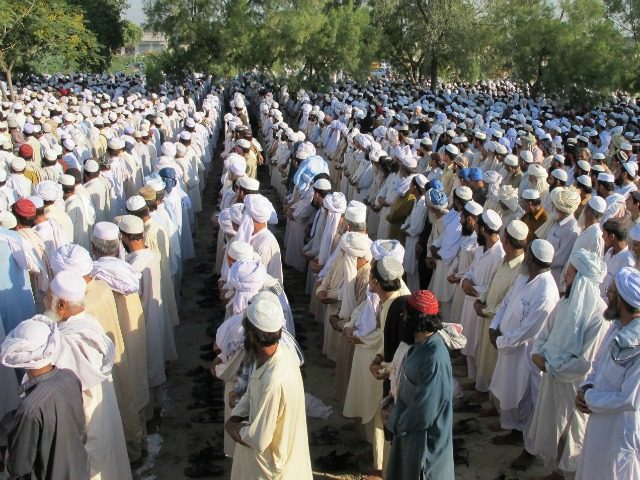WASHINGTON, D.C. — The government of Pakistan has failed to take “adequate” action against the al-Qaeda and Taliban-linked Haqqani Network, which poses the “primary threat” to the American military and its allies fighting in Afghanistan, declared a top U.S. commander.
U.S. Gen. John Nicholson, the number one commander of U.S. and NATO troops in Afghanistan, recently told Pentagon reporters that he agrees with U.S. Secretary of Defense Ash Carter that Islamabad is not applying “adequate pressure” on the Haqqani Network to “justify additional coalition support funds to Pakistan.”
The Pentagon has deemed the Haqqani Network, which is affiliated with both al-Qaeda and its ally, the Afghan Taliban, the “greatest threat” against the the U.S.-led coalition and Afghan forces.
Gen. Nicholson told reporters last Friday:
As far as the strength of the Haqqanis … the secretary of defense in August … said he was unable to certify that there was sufficient pressure being placed on them to justify additional coalition support funds to Pakistan. Kind of a lengthy explanation, but it was his way of saying that there’s … not adequate pressure being put on the Haqqanis.
And I concur and with the Secretary’s assessment on that … that the Haqqanis operationally have been able to conduct operations inside Afghanistan; they constitute the primary threat to Americans, to coalition members, and to Afghans, especially in and around [the Afghan capital] Kabul.
The National Defense Authorization Act (NDAA) for fiscal year 2016 required the Pentagon chief to report to Congress whether Islamabad was conducting military operations “that are contributing to significantly disrupting the safe haven and freedom of movement of the Haqqani Network in Pakistan.”
As mandated by the 2016 law, the United States has stopped more than $300 million in military reimbursements to Pakistan for refusing to take adequate action against the Haqqani Network.
The 2015 NDAA noted that since the war in Afghanistan started in October 2001, the U.S. “has obligated nearly $30 billion … in taxpayer money for security and economic aid to Pakistan.”
Gen. Nicholson told reporters that authorities granted by President Barack Obama allow the U.S. military to attack the Haqqani Network.
The general said:
The authorities that have been granted by President Obama enable us to take any measures necessary to defend against the Haqqani threat. So we have authorities into terms of force protection, so we can act against them when we identify them.
We track their actions very closely, especially as it relates to the Kabul threat streams. … I have the authorities I need to defend us against that threat.
Nicholson pointed out that al-Qaeda and the Islamic State (ISIS/ISIL) were on top of the list of terrorist groups targeted by the U.S.-led coalition in the Afghanistan-Pakistan region.
“Of the 98 U.S. or UN-designated terrorists organizations around the globe, 20 of them are in the Af-Pak region,” he explained. “This is the highest concentration of the numbers of different groups in any area in the world.”
U.S. and Afghan officials have long accused the Pakistani government of providing sanctuary to terrorists carrying out attacks in Afghanistan.
“Of the groups involved in the Taliban-led insurgency, the Haqqani Network remains the greatest threat to U.S., coalition, and Afghan forces and continues to be a critical enabler of al-Qaeda,” reported the Pentagon in its most recent assessment of the Afghanistan war.
“The United States continues to be clear with Pakistan about steps it should take to improve the security environment and deny safe haven to terrorist and extremist groups,” it added.
According to the July 30 quarterly report to Congress, the Special Inspector General for Afghanistan Reconstruction (SIGAR), a watchdog agency, said that the majority of recent terrorist attacks have taken place in provinces that border Pakistan.
The Afghan strongholds of the the Taliban, al-Qaeda, and the Islamic State are located in provinces along the country’s border with Pakistan.
Gen. Nicholson mentioned that the majority of the estimated “1,200 to 1,300” Islamic State members in Afghanistan are Pakistanis — members of the Pakistani Taliban Tehrik-e Taliban Pakistan (TTP).
Two top Republican lawmakers in the United States have introduced legislation to officially designate Pakistan a state-sponsor of terrorism, a move that would please its regional rival India, which has recently provided military assistance to Afghanistan.
U.S. Secretary of State John Kerry urged Islamabad at the end of August to join other countries in combating jihadists operating on Pakistani soil, adding that it should not feel left out by ongoing talks between the United States, India, and Afghanistan.

COMMENTS
Please let us know if you're having issues with commenting.